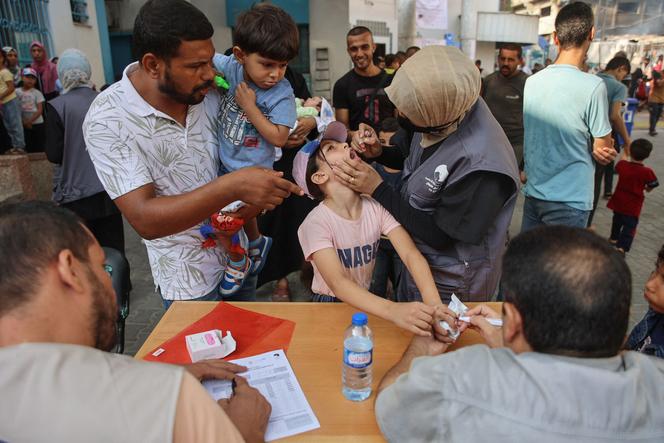


It's only a "humanitarian pause" in the north of the Gaza Strip, not even a ceasefire on the enclave as a whole, and just long enough for a vaccination campaign. The "pause" conceded by the Israeli army and Hamas is limited in both time and space. It began on Tuesday, September 10, with the aim of enabling the second phase of a polio vaccination campaign, which began on September 1, further south, to be carried out in this part of the territory. This new phase is due to take place from Tuesday to Thursday, for seven hours each day, during which the Israeli army and Hamas suspend warfare in a delimited area, but continue their activities everywhere else.
The intention is to prevent the spread of the poliovirus, originally detected in wastewater in July before the Gaza Ministry of Health reported a first case in August. The massive destruction of infrastructure and the forced displacement of 1.9 million of the enclave's 2.3 million residents have encouraged the spread of this virus. Negotiations between United Nations officials and the Israeli authorities had been conducted in advance to set up a framework for "humanitarian pauses" to enable the vaccine to be administered orally in two doses, with a booster four weeks later, to just over 600,000 children (the exact number is not known, due to deaths, disappearances and births, which can no longer be accurately counted).
Each day, however, the truce ends at 3 pm. "At 4 pm, the bombardments could resume," noted a humanitarian source. The initial request from the UN side was for a Gaza-wide suspension of fighting. After negotiations, three zones were drawn up, where the campaign is being carried out within defined perimeters.
There has been no fundamental change in the policy of the Israeli authorities regarding access – and therefore restrictions – on international humanitarian aid to Gaza. Vaccination has been understood as a vital necessity by all those implicated in the Gaza Strip. The polio strain represents a regional risk that, if left unchecked, could spread beyond Gaza. However, the virus will not be eradicated after this preventative phase. "A month later, it will be time for the second round of vaccination," explained Jonathan Crickx, spokesperson for UNICEF Palestine. "Only then can we begin the process of assessing whether the operation has worked." A new round of negotiations will be necessary to re-establish the conditions for the second round of vaccinations.
The virus detected is said to be "type 2" (of the three existing). A local vaccination campaign normally extinguishes the outbreak. If nothing is done, the epidemic could start very quickly and become difficult to contain. Beyond the justified fear of such an eventuality, the vaccination campaign also demonstrates that humanitarian operations led by UN groups can be successfully carried out in Gaza as soon as the war is over.
You have 32.54% of this article left to read. The rest is for subscribers only.
